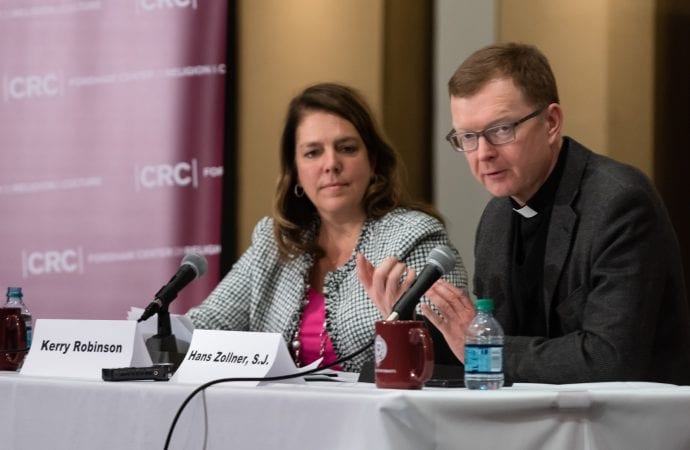A member of the organizing committee for February’s Vatican sex abuse summit has dubbed the meeting “partly a success,” saying it achieved his main goal of bringing about “unity for the whole church leadership that was present.”
Jesuit Father Hans Zollner, head of Rome’s Center for Child Protection at the Pontifical Gregorian University, said that 2018 was a “year of change” in the Church’s understanding of the global sex abuse crisis and that “we are at another level of awareness.”
In reference to cardinals now under scrutiny for mishandling abuse cases, or for abuse itself, Zollner said “untouchables have become touchable and are facing prison sentences,” adding that the Church has been greatly influenced by the “Me Too” movement,” which has caused a cultural awakening on issues of abuse of power and sexual misconduct.
Zollner’s remarks were delivered Tuesday during a discussion on “Reckoning and Reform: New Frontiers on the Clergy Abuse Crisis,” hosted by Fordham University’s Center on Religion and Culture, which also included a presentation by John Jay College researchers Karen Terry and Margaret Smith on new developments and data in their efforts to study the roots and extent of the abuse crisis.
The German Jesuit priest, appointed by Pope Francis as one of the organizers of the summit which brought together the heads of every bishops’ conference around the globe, said that in surveying the U.S. Catholic Church, the country is “in some state of what Saint Ignatius termed ‘spiritual desolation’ - a decrease of faith, hope, and love,” suffering a severe loss of trust in the Church over the issue of abuse.
Even so, he warned that such frustrations and anger haven’t yet helped to proactively counter the crisis, and he encouraged attendees to “hide neither in denial nor in depression.”
“What is lacking is the communication of the heart,” Zollner said. “Once you believe a person means what he says, then we trust we are going forward.”
He said that until Church leaders are motivated by real conversion on the need to confront the issue of abuse - not by “judges, the press, or SNAP [the leading network of survivors of sex abuse]” - but by their own conviction, challenges will remain.
Zollner, a leading voice for reform on the abuse crisis, said the Church in America and Australia “cannot be used as a metric of success” for the recent summit, as such countries already have the “highest standards” for responding to abuse. In his estimation, the focus should be on the 75 percent of places where the issue of abuse is not “the number one issue” in either the Church or the country.
He argued that the four-day meeting of the presidents of bishops’ conferences brought about a “change in awareness of leaders” from such places.
In addition to pointing to African and Asian countries, Zollner said that central and eastern European countries, specifically Poland, the Czech Republic, and Hungary, have struggled to confront the crisis.
Given their history of communism, where many of today’s bishops grew up with a distrust of media and the police, he said “reporting a priest [for abuse] is like handing over one’s own son to execution.”
Zollner also said he was disappointed in Francis’ final message at the summit, as he believed it did not adequately reflect his thinking. He added that the pope is the subject of criticism from both the left and the right, laity and bishops alike, because “he pushes us to take more responsibility” and is not simply authoritarian.
Looking ahead, Zollner said the Church should be prepared for more grand jury reports and national reviews, such as the Royal Commission in Australia. He warned that this “will not be over in our lifetimes.”
As for follow-up from Rome, he said that promised new guidelines concerning child protection for the Vatican City State, along with a handbook or vademecum for bishops for handling abuse cases, should be forthcoming within the next few weeks.
He also argued that broader and deeper changes are needed, saying the Church lacks a theology of abuse and needs a better understanding of the place of victims within dioceses.
In addition to Zollner, two of the researchers who co-authored the 2004 John Jay Study on the “Nature and Scope of Sexual Abuse of Minors by Catholic Priests and Deacons in the United States” said that in light of major reviews and studies, such as the Royal Commission in Australia and German and Poland reports, they argued their original data has been “substantially confirmed by studies in the intervening time.”
Fifteen years after their original findings, they believe that subsequent reports have confirmed the peak window of abuse fell between 1978-1982 and that the crimes of abuse were one of opportunity driven by a range of factors.
“Our data do not indicate that homosexuality causes someone to abuse a child, and this is supported by nearly every study that I have read in the social science literature,” said Terry.
Smith concurred, also pushing back against the idea that abuse is caused by celibacy, saying that nearly one-third of Americans are living celibate, or sexless, lives.
“I think that these terms become labels, and they become easier answers than the more profound question of how it is that we allow those with power and prestige to abuse those with less power and prestige,” she concluded.

